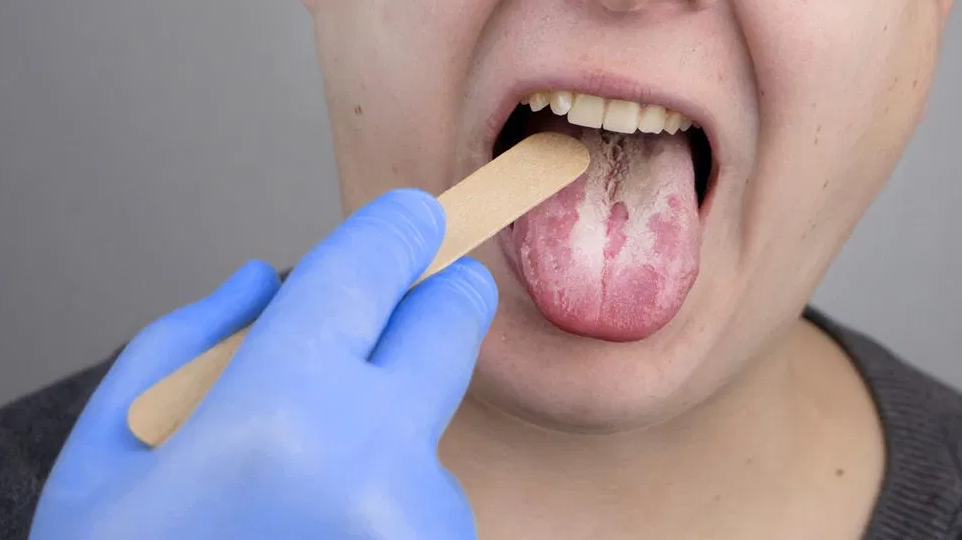Candidiasis of the mouth, also known as oral thrush, candida, or oral yeast infection, is a non-contagious fungal infection of the mouth. Currently, it is unclear how common candidiasis is, as it mostly goes unreported.
Since oral thrush has been a hushed topic, it leaves us wondering what it is and whether it is dangerous. Here is everything you need to know about this oral yeast infection.
What Is Oral Thrush?
Oral thrush is a yeast infection that develops in your mouth due to the overgrowth of the fungus - Candida albicans - accumulating in the lining of your mouth. This fungus already exists in the mucus membranes lining of your mouth, but when it overgrows, it causes oral thrush. However, if you have a strong immune system, the fungus will not overgrow.
What Does Oral Thrush Look Like?
Have you recently been noticing creamy white spots on your tongue, palate, or the lining of your cheeks and the back of your lips? If yes, you might be infected with oral thrush, and you should see your doctor for effective treatment.
The white spots, also known as lesions, may also spread to the roof of your mouth, your gums, tonsils, or the back of your throat. This fungal yeast infection causes a mild burning sensation, irritation, pain, and redness in the infected areas.
White spots on the tongue may indicate an oral fungal infection (thrush). Snoring can be caused by a variety of reasons, such as upper airway blockage, sleep apnea, or congestion. Keep a record of all of your symptoms.
Oral thrush can be annoying and cause pain while swallowing. It is generally considered a minor problem for healthy people, as it disappears in a few weeks with proper antifungal treatment.
What Are the Symptoms of Oral Thrush?
In the early stages, you might not be able to see any visible symptoms; however, as the infection worsens, you might catch one or more of the following symptoms:
●White or yellowish bumps on your inner cheeks, tongue, tonsils, gums, or lips
●Some bleeding if the bumps or patches are scraped
●Soreness, burning, pain, irritation, or redness on the tongue or around the lesions
●Raised spots inside your mouth that looks like cottage cheese
●Dry and cracked skin around your mouth
●Difficulty in swallowing, speaking and eating
●Cotton or dry mouth
●Decreased or lost sense of taste
●A bad taste in your mouth
In some severe and rare cases related to a weakened immune system from HIV/AIDS or cancer, oral thrush can also spread downwards from your mouth to the esophagus. In this case, you will experience difficulty swallowing and feel your food getting stuck in your throat. Moreover, the same fungus that causes thrush can cause yeast infections in other body parts.
What Are the Causes of Oral Thrush?
Oral thrush and other yeast infections are caused due to an overgrowth of the fungus called Candida albicans. It is entirely normal for a small amount of Candida albicans to live in your mouth. If you have a properly working immune system, it helps keep this Candida in control.
But if your immune system is compromised, this fungus can overgrow. The following are some of the reasons that trigger the growth of this fungus and cause oral thrush:
1. Antibiotics
Antibiotics are generally prescribed to fight off harmful bacteria. However, there is a possibility that these antibiotics may temporarily kill harmless bacteria, weakening your immune system and creating a perfect environment for Candida to overgrow and cause thrush symptoms.
2. Dry Mouth
A dry mouth is an oral condition where your salivary glands cannot produce enough saliva to keep your mouth wet. Saliva has a crucial part in a person’s oral health as it has antibodies that help prevent gingival mucosal erosions and ulcers. When the salivary function is compromised, you are at a high risk of developing oral thrush.
3. Poor Oral Hygiene
Following poor oral practices such as using an old toothbrush with the accommodated fungus can also cause oral thrush. To prevent the spread of bacteria and fungus that causes thrush, you should change your toothbrush every three months.
4. Immunity Weakening Conditions
Medical conditions like HIV/AIDS, leukaemia and diabetes weaken your immunity and are one of the common causes of oral thrush.
5. Vaginal Yeast Infections
The fungus that causes vaginal yeast infection is the same fungus that causes oral thrush. Hence, if you have a vaginal yeast infection, you are also at risk of developing oral thrush. Moreover, if a woman has a yeast infection while giving birth, she can pass it on to her baby during labour.
Additionally, you could notice that your discharge smells unpleasant or has a faint fishy odour, and that it is thicker or more watery than usual. There are various female thrush treatments available that can help treat vaginal thrush.
6. Bottles and Pacifiers
Due to excess usage of bottles and pacifiers, your baby’s mouth can become too moist, making it an ideal environment for yeast. This can cause oral candidiasis. To prevent it in babies, never let your infant go to sleep with a bottle or pacifier in their mouth. Moreover, you should limit the use of pacifiers throughout the day.
To eliminate fungus and bacteria, wash their pacifier and bottle thoroughly in a dishwasher or soak them in warm water.
How Can You Prevent Oral Thrush?
To reduce the risk of developing oral thrush, try out the following prevention steps:
●The best way to prevent oral thrush is to follow excellent oral hygiene. Brush your teeth twice a day with fluoridated toothpaste and floss daily. Moreover, you need to be more careful and follow proper oral hygiene with braces, as taking care of them is not easy.
●Make sure that you clean your Invisalign properly before using it. Do not wear them without proper cleaning.
●Eat a healthy diet to maintain a strong immune system.
●If you have dentures, make sure that you remove them before going to bed. Clean them as advised by your dentist.
●If you have diabetes, practice proper steps to manage your blood sugar levels.
Make sure to consult a doctor if you develop a yeast infection on any of your body parts because there are chances of it spreading from one part of the body to another.
Krishma Patel is the Co-founder and the Superintendent Pharmacist at MedsNow, an online pharmacy in the UK that provides health and wellness products and treatments along with free online consultations. She is passionate about showcasing the integral function community pharmacies can play in supporting the healthcare system and the NHS by providing patients with high-quality, safe and discreet access to healthcare at their convenience. Along with being the co-founder of MedsNow, Krishma is also the Director and the Superintendent Pharmacist of Enimed Ltd., an independent pharmacy group comprising 32 branches.



















